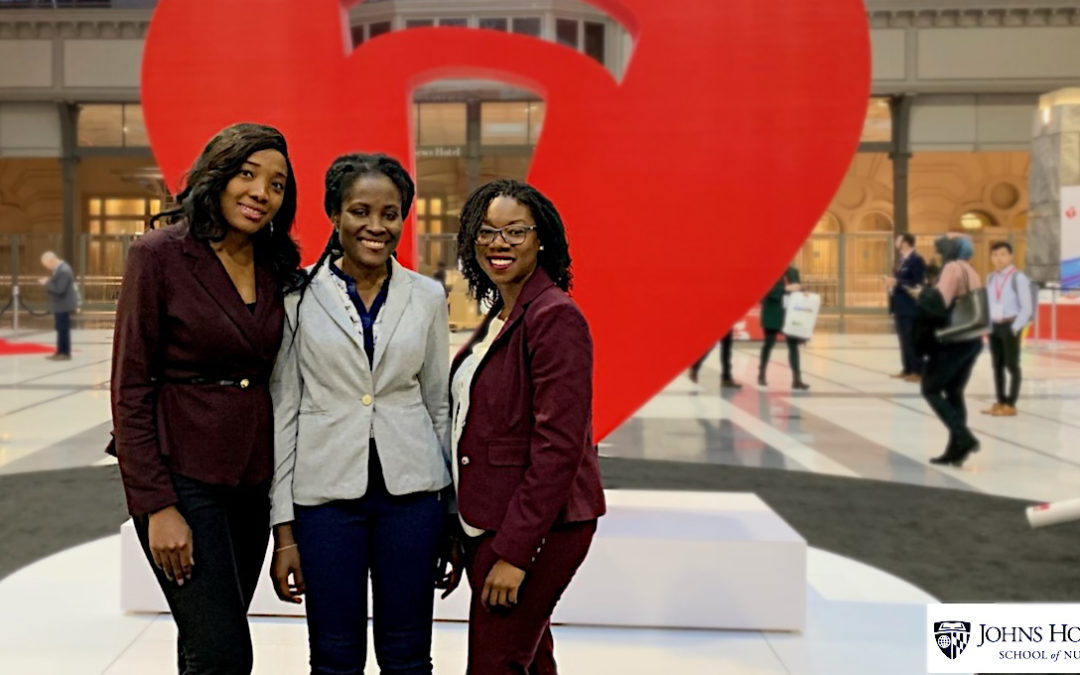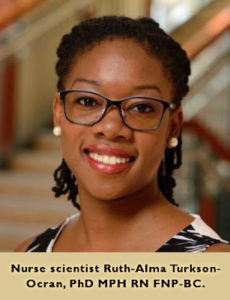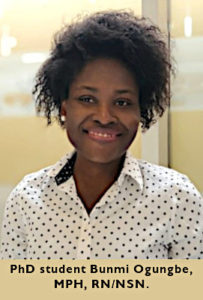“We’ve come a long way,” remarks Dr. Yvonne Commodore Mensah, Ph.D, MHS, RN. Now an assistant professor at the Johns Hopkins School of Nursing—where she started her PhD study in 2010—she is guiding the next generation of emerging scientists. 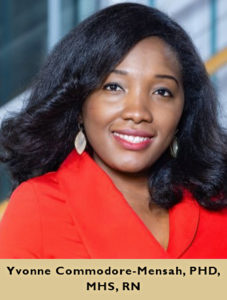
With a special interest in mentees of color.
That’s because sheer numbers are not the whole story of diversity, equity, and inclusion. In 2018-2019, about 15,000 Black Americans earned PhDs, about 14,000 Hispanic or Latino Americans, and just 720 American Indians — compared to over 100,000 white Americans.
Mentors guide junior researchers through opportunities with world-renowned nursing faculty, cutting-edge facilities, and opportunities for interdisciplinary collaboration throughout Johns Hopkins University and health care system. Among researchers of color and women, mentors are also critical for sponsorship and in building the fortitude to navigate underrepresented and unfamiliar spaces.
Meet Dr. Commodore-Mensah and her mentees: Dr. Ruth-Alma Turkson-Ocran and Dr. Oluwabunmi (Bunmi) Ogungbe
“Yvonne was always asking me ‘when are you going to come to Hopkins and get your PhD?’” laughs Dr. Ruth-Alma Turkson-Ocran, Ph.D., MPH, FNP-BC, RN.
They’re the same age – they are also both from Ghana, went to the same high school, and came (unknowingly) to the U.S. in the same year to become nurses. Dr. Commodore-Mensah traveled a more direct research path however, while Dr. Turkson-Ocran became a nurse practitioner first. She earned her PhD at the Johns Hopkins School of Nursing in 2019 and was a post-doc at Johns Hopkins School of Medicine until summer 2021, when she became an instructor of medicine at the Beth Israel Deaconess Medical Center and Harvard Medical School.
On the other hand… “I found and reached out to Yvonne when I began to explore doctoral programs,” Bunmi Ogungbe, MPH, RN/BSN says. Bunmi is from Nigeria. “She was one of the first people investigating cardiovascular disease among African immigrant populations.”
The COVID-19 curveball
Heart disease and African immigrant health are interests all three women share. In fact, Bunmi began the PhD program at Johns Hopkins in 2019 intending to investigate cardiovascular disease medication adherence in Ghana, working through an existing study by Dr. Commodore-Mensah. But then COVID-19 threw her work a curveball.
Grounded, with travel unsafe, Bunmi conferred with Dr. Commodore-Mensah and additional mentors, including former dean Patricia Davidson and other faculty internationally recognized for their cardiovascular and chronic care research, to take her research in a new direction: examining biomarkers that indicate an injury to the heart, to determine the long-term cardiovascular effects of COVID-19 among Baltimore City residents.
“Dean Davidson advised me that part of the journey is knowing when to pivot and take advantage of emerging opportunities,” Bunmi says. “Yvonne helped me work through such a big change. She has connected me with so many mentors and sponsors, and brought me into the spaces that matter.”
Mentoring relationships foster bidirectional learning
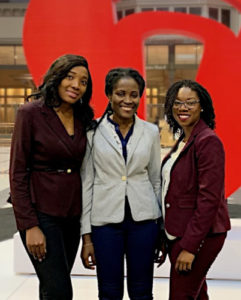 “It’s really interesting when the mentee takes a slightly different path. There is mutual learning that enhances our skills and knowledge,” says Dr. Commodore-Mensah. “After working with Bunmi I was asked to give a presentation on cardiovascular disease and COVID. And Ruth-Alma is my tech person.”
“It’s really interesting when the mentee takes a slightly different path. There is mutual learning that enhances our skills and knowledge,” says Dr. Commodore-Mensah. “After working with Bunmi I was asked to give a presentation on cardiovascular disease and COVID. And Ruth-Alma is my tech person.”
As faculty at the Beth Israel Deaconess Medical Center and Harvard Medical School, Dr. Turkson-Ocran gets to explore her interest in technology with projects investigating blood pressure at home, ambulatory blood pressure (meaning tracking blood pressure over a 24-hour period), and exploring how to use machine learning to examine blood pressure. Incredibly, information on blood pressure from wearable devices could be actionable in as little as five years.
With the interview process for her faculty position fresh in mind, Dr. Turkson-Ocran reflects on Dr. Commodore-Mensah’s generosity.
“It’s empowering to work on a multicultural team, yet, as underrepresented women in health and academia, there is something to be said for having someone who looks like me there to help raise me up.”
– Ruth-Alma Turkson-Ocran, PhD, MSN, MPH, RN
“Yvonne has constantly sponsored me, encouraged me to take on responsibilities I didn’t realize I was ready for.” She continues, “It’s empowering to work on a multicultural team, yet, as underrepresented women in health and academia, there is something to be said for having someone who looks like me there to help raise me up. It tamps down imposter syndrome and reinforces that this path is truly meant for me.”
“There is this façade of scarcity in academia,” Bunmi says. “People feel the need to hoard resources, opportunities, networks. Yvonne doesn’t do that.”
“You don’t lose anything by being kind.’ Former Dean Davidson used to say that, and I’ve been so fortunate with all my mentors that I can’t help but pass it on,” says Dr. Commodore Mensah.

